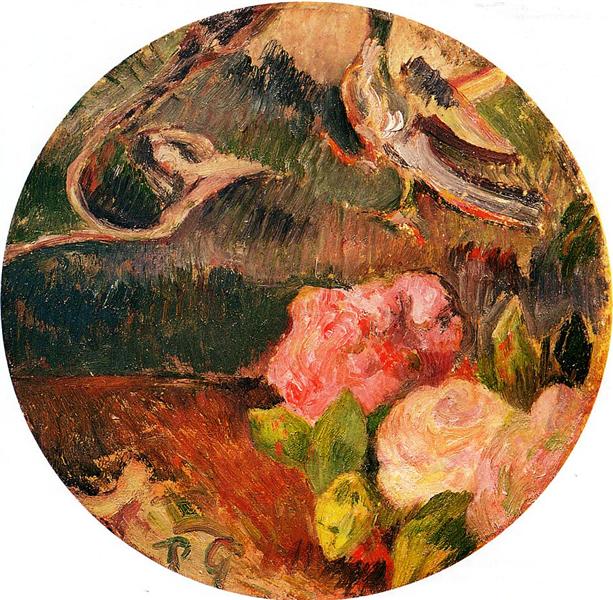Description
Paul Gauguin's "Flowers and a Bird", created in 1885, stands as a landmark example of the use of color and form in the context of post-impressionism, to which the artist contributed significantly. With its vibrant palette and almost symbolic character, this painting manages to capture the viewer not only with its visual elements, but also with the serenity that emanates from its composition.
The work depicts a set of lush flowers, predominantly warm shades of yellow, pink and red, which are intertwined with darker shades of green and brown that create a notable visual contrast. The floral exuberance, which often symbolizes the ephemeral beauty of life, comprises a variety of shapes that are arranged on a pictorial plane that defies traditional perspective. The composition lacks a detailed background, allowing the flowers and the small bird to stand out with an almost sculptural presence. The simplicity of this compositional choice generates an immediate focus on the central elements of the work, evading distractions and allowing the viewer to immerse themselves in the sensorial experience provided by the colors and textures.
The bird, delicately perched among the flowers, becomes the only element that suggests life and movement. Its stylized appearance complements the nature of the flowers, adding a tone of curiosity and intrigue. The relationship between the bird and the flowers can be interpreted as a metaphor for the connection between humans and nature, a recurring theme in Gauguin's work throughout his career. This painting also reflects the artist's quest to explore forms of expression beyond realistic representation, delving into a space where meaning is sensed rather than seen.
Gauguin, known for his rejection of the conventions of academic art, made his style a search for inner truth and emotional expression. His bold use of color, a hallmark of his work, is not merely intended for representation, but seeks to convey deep feelings and sensorial evocations. The vibrant colors are not merely decorative; they are carriers of meanings that transcend the surface. In this sense, "Flowers and a Bird" can be seen as a precursor to later explorations of symbolism in art.
The work would align itself with Gauguin's artistic trajectory towards a more expressive and symbolic horizon, which we would see develop more fully in his works of later years, especially in his explorations in Tahiti. Although "Flowers and a Bird" is set within a European context, it foresees a way of seeing nature and existence that would lead him to even bolder discoveries in tropical landscapes and exotic portraits.
This work can often be situated within the broader conversation about how art can transform and redefine what is perceived. Through his gaze, Gauguin not only presents a visual interpretation of the natural world, but also invites the viewer to contemplate the complexity of the interconnection between life, beauty and fragility. The choice of flowers and the bird as protagonists of his work thus becomes a meditation on life itself, a look at what is present and what will inevitably fade away, encapsulating the essence of his artistic legacy.
KUADROS ©, a famous painting on your wall.
Hand-made oil painting reproductions, with the quality of professional artists and the distinctive seal of KUADROS ©.
Painting reproduction service with satisfaction guarantee. If you are not completely satisfied with the replica of your painting, we will refund 100% of your money.

